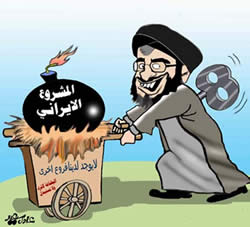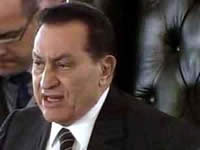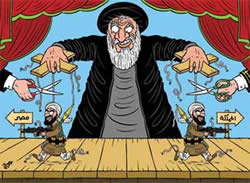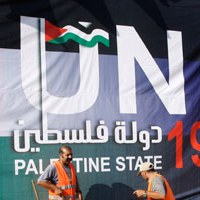The State Security Court in Egypt issued prison terms (some of them long) to operatives of a Hezbollah group exposed in Egypt in April 2009.
Published: may 04, 2010; Intelligence and Terrorism Information Center.
On April 28, the State Security Court in Cairo, Egypt, issued sentences to 26 operatives of a Hezbollah network. The network was planning to perpetrate attacks against tourist sites and groups of Israeli tourists in Sinai, and to smuggle weapons into the Gaza Strip for Hamas.
Judge Abd Abdallah Salam Jum’ah convicted the network operatives of espionage, membership in a terrorist organization, and assisting Hamas. The network operatives had come to Egypt from Lebanon and Sudan, some of them being Palestinians. Four defendants, including gang leader Mohammad Qablan, were sentenced to life in prison, but all four managed to escape to Lebanon before being arrested and therefore the sentences were given in absentia. The network commander Sami Shihab was sentenced to 15 years in prison. The other network operatives were sentenced to six months to ten years.
Hezbollah leaders in Lebanon strongly condemned the court’s decision:
Hezbollah secretary-general Nasrallah described the detainees as “brothers, men of resistance, and noble jihad warriors”, and not “outlaws, bandits, and terrorists” as they were called by the Egyptian court. He said that their only sin was “helping their brothers in the Gaza Strip and the legitimate Palestinian resistance”, and that all the other things said about them were untrue, stories designed to back up the legal proceedings against them (Al-Akhbar, Al-Nashra website, April 29, 2010).
Kamel al-Rifa’i, a member of the Hezbollah faction in the Lebanese parliament, said that the trial was not criminal but rather political. He also said that the Egyptian court, through the trial and the political sentences, wanted to make the Egyptian people think that the defendants were involved in terrorist activities, when in fact their job was to send weapons, money, and supplies to “our besieged brothers in the Gaza Strip”. The Egyptian court dealt with the issue through a narrow viewpoint, without taking into consideration the feelings and goals of those youngsters (Al-Sharq al-Awsat, April 29).
Egypt announced the exposure of the network in April 2009; however, according to the official newspaper Al-Ahram (April 9), the network had started operating as early as in 2007. According to Egyptian and Arab media reports, the network was involved with smuggling weapons and funds to the Gaza Strip, transferred to Hamas through the Rafah tunnels. The weapons were intended to reach the Gaza Strip through Sudan and Egypt (Al-Hayat, April 9, 2009). In addition, the network operatives planned a series of attacks against targets in Cairo and Sinai, including sites where Israelis often stay. The network operatives were involved in the establishment of commercial projects as a cover for their activities, gathering intelligence for terrorist attacks (including surveillance on tourist sites in northern and southern Sinai), acquiring apartments in the Egyptian part of Rafah and in Al-Arish, and tracking shipping traffic through the Suez Canal. The network operatives contacted criminal elements in Egypt to forge Egyptian documentation so that they could leave Egypt and rent a hideout (Egyptian TV, April 8, 2009). Some of the network operatives used the cover of Hezbollah’s Al-Manar TV channel (Al-Masri al-Youm, April 10, 2009).
Read also the April 13, 2009 Information Bulletin: “Egypt exposes a Hezbollah network on its soil, claiming it not only smuggled weapons into the Gaza Strip and but also planned to carry out terrorist attacks and subversion activities. Hassan Nasrallah admitted a detained Hezbollah operative was involved in smuggling but denied other accusations.”
” written on the side. The ticking bomb is inscribed “The Iranian project” (Al-Nadwah, Saudi Arabia, April 12, 2009).”]
The Egyptian and Arab media reported that the Egyptian security services exposed a Hezbollah network which had been active in Egypt for a long time. So far several dozen Lebanese, Palestinian and Egyptians directed by Hezbollah have been detained. The network smuggled weapons (possibly from Iran ) through Sudan and from there to Egypt , and then through tunnels in Rafah into the Gaza Strip for Hamas. In addition, according to the reports, the network was involved in attempted terrorist attacks in Sinai and Cairo , including sites where Israeli tourists congregate, and in subversive activities against the Egyptian regime.
Egypt reacted angrily to the exposure of Hezbollah activity on its soil and accused the organization and Iran of interfering in Egyptian internal affairs and endangering its national security. Hezbollah leader Hassan Nasrallah, in an unprecedented statement, admitted that Egypt had indeed detained a Hezbollah operative and a number of others connected with him. He claimed that the detainee was a “logistical operative” who dealt with smuggling weapons and fighters into the Gaza Strip. However, he claimed that Hezbollah had no branches outside in Lebanon and that it was not involved in clandestine or subversive activities in any other Arab country (a fabrication, since Hezbollah has been involved in subversive activity in both Iraq and Jordan ).
The Hezbollah network exposed by the Egyptians, apparently shortly before Operation Cast Lead, is more proof of the military support Iran gives Hamas in the Gaza Strip, either directly or through Hezbollah, which operates as a subcontractor to promote Iranian interests. During the period before Operation Cast Lead, Iran and Hezbollah provided Hamas with weapons, among them hundreds of standard 122mm Grad rockets with a range of 20-40 kilometers and advanced anti-tank missiles; technical know-how which enabled Hezbollah to manufacture lethal Shawaz EFPs, inspired by Hezbollah in Lebanon; advanced military training in Iran for hundreds of terrorist operatives belonging to Hamas and the other terrorist organizations; financial support for Hamas’s political bureau and military-terrorist wing to the tune of hundreds of millions of dollars a year; and political and propaganda support. All of the above were done to strengthen Hamas’s military infrastructure in the Gaza Strip, encourage it to continue its terrorist attacks against Israel and sabotage any dialogue between Israel and the Palestinian Authority. 1
Hezbollah network in Egypt exposed
(Updated to April 13, 2009 )
The Egyptian and Arab media gave broad coverage to the exposure of the Hezbollah network. It occurred several months ago, apparently before Operation Cast Lead, but the search for the network operatives is still continuing. According to the reports, Egyptian counterterrorism forces in Sinai are pursuing more than a dozen Lebanese suspected of ties to the Hezbollah network (Al-Jazeera TV, April 13, 2009 ; Al-Masri Al-Youm , April 12, 2009 ). According to the April 9 issue of the official Egyptian newspaper Al-Ahram , the Hezbollah network began its activities in 2007, when a senior Lebanese operative (who lived in Dahiya, the southern Shi’ite suburb of Beirut and a Hezbollah stronghold) entered Egypt on a forged passport. In November 2008 the Egyptian security forces detained Hezbollah operative Sami Shihab, and it was apparently his detention that led to the exposure of most of the members of the terrorist network.
According to the Egyptian media, so far dozens of Lebanese, Palestinians and Egyptians with ties to Hezbollah have been detained. They were organized into a number of squads and were directed by a prominent Hezbollah figure in Lebanon (Al-Masri Al-Youm , April 12, 2009 ). The central figure in Egypt was Sami Shihab2, who was detained with two young Palestinians carrying Palestinian passports issued in Lebanon . Sami Shihab, who settled in El-Arish, was the only individual who maintained telephone contact with the Hezbollah figure in Lebanon running the network (Al-Masri Al-Youm , April 12, 2009 ).
According to the Egyptian and Arab media, the network smuggled weapons and money for Hamas use, using tunnels in the Rafah region. The weapons came via Sudan to the Gaza Strip ( Al-Hayat , April 9, 2009 ). The network also planned to carry out a series of terrorist attacks in Cairo and Sinai, including places where Israeli tourists congregate. They established commercial ventures to cover their activities of collecting intelligence information needed to carry out terrorist attacks (including monitoring tourists sites in northern and southern Sinai). They bought safe apartments in Egyptian Rafah and in El-Arish, and observed the movement of ships through the Suez Canal . They also contacted criminal elements in Egypt to obtain forged Egyptian documents which would enable them to leave Egypt and to rent safe houses 3 (Egyptian TV, April 8, 2009 ). Some of them worked for the Hezbollah station Al-Manar TV as a cover for their activities 4 ( Al-Masri Al-Youm , April 10, 2009 ).
Responses to the affair
(As of April 13, 2009 )
Egypt
Following the exposure of the Hezbollah network Egypt initiated an anti-Hezbollah, anti-Iran political and media campaign. In a telephone conversation, Egyptian President Hosni Mubarak told Lebanese president Fuad Siniora that the Egyptian judicial system would bring those responsible to trial (Haaretz , April 13, 2009 ). Omar Suleiman, head of Egyptian intelligence, visited Saudi Arabia and told King Abdallah about Hezbollah’s subversive activities in a number of Middle East countries, especially Egypt and Saudi Arabia ( Al-Qabas , April 12, 2009 ). Ahmed Nazif, Egyptian Prime Minister said that Egyptian security was a “red line” that could not be crossed or harmed. He said that Egypt was determined not to allow anyone inside or outside the country to endanger the lives of Egyptian citizens or Egypt ‘s national economy (Middle East News Agency, April 11, 2009 ). Safwat el-Sherif, head of the Shura Council, gave a speech in which he called Hezbollah “crooks and liars” and accused the organization of “exporting conflicts and destruction” while doing nothing to help the Palestinian people (Middle East News Agency, April 12, 2009).

Egyptian President Hosni Mubarak: “We will not permit anyone to harm Egyptian sovereignty or undermine its stability” (Muhit website, April 13, 2009).
The Egyptian media angrily attacked Hassan Nasrallah and accused him of planning to harm Egypt , its citizens and its regime. “An Egyptian source” said that Nasrallah’s speech proved that Hezbollah wanted to implement its policy in Egypt and the entire region to advance Iranian interests (Note: For Nasrallah’s speech see below). He was described by the establishment press and political figures as “the monkey sheikh,” “an Iranian agent,” “a Lebanese from [the Iranian city of] Qom ,” 5 and “leader of the militias in the Iranian party in Lebanon .” On April 12, the editor in chief of Al-Ahram lauded the Egyptian security services which had succeeded in “ exposing the extent of Iranian intervention in internal Egyptian affairs.” On the same day an editorial in Al-Gumhuriya stated that “we will not allow you, monkey sheikh, to make fools of the symbols of our judicial system. You are an experienced criminal who killed his own countrymen, we will not let you threaten the safety and security of Egypt .”

Egypt and Saudi Arabia threatened by Iranian subversion but intent on preventing it ( Al-Watan , Saudi Arabia, April 12, 2009).
Other Egyptian reactions:
1. Lawyers and members of the Egyptian Parliament demanded that a warrant be issued for Hassan Nasrallah and that his name be added to the list of the accused, because he had committed crimes which deserved the death penalty ( Al-Masri Al-Youm , Al-Arabia TV, April 12, 2009 ).
2. Egyptian “security sources” said that the prosecution in the Egyptian high court for national security was investigating the possibility that a number of Muslim Brotherhood activists were involved in the affair (Al-Jareeda , April 12, 2009 ). Egyptian lawyers also demanded that the Muslim Brotherhood’s Supreme Guide, Mahdi Akef be investigated as well (Al-Masri Al-Youm , April 12, 2009 ). On the other hand, Mahdi Akef defended Hezbollah, saying that “the resistance [i.e., terrorism] had to be supported at all costs” (Al-Sharq Al-Awsat , April 13, 2009 ).
Hezbollah’s reaction
Hezbollah leader Hassan Nasrallah admitted the involvement of his organization in smuggling operatives and weapons into the Gaza Strip from Egypt , although he denied the Egyptian allegations that Hezbollah was involved in subversion and terrorist attacks. In a strong speech broadcast by Al-Manar TV on April 10, he said the following:
(Al-Manar TV, April 11, 2009).”]1. The Lebanese citizen detained by Egypt was indeed a Hezbollah operative who dealt only with “logistic activity” along the Egypt-Gaza Strip border: “…Brother Sami [Shihab] is a member of Hezbollah. We do not deny that and are not embarrassed by him…” According to Nasrallah, his activities included transferring weapons and “fighters” [i.e., terrorist operatives]into the Gaza Strip for Hamas. 6 The number of operatives with whom Sami Shihab collaborated did not reach ten and the Egyptian claim that they exposed a complex network of fifty operatives was not true.
2. The other allegations presented by the Egyptian prosecutor were “fictions” and Hezbollah operatives were not involved in subversion and attacks. Nasrallah “innocently” claimed that Hezbollah was “a Lebanese party” and had no branches in other Arab countries. He added that he was willing to investigate every report about the involvement of Hezbollah activists in political crises in the various Arab countries. 7
3. He also claimed that the Egyptian regime had collaborated with Israel when it closed the Rafah crossing and destroyed the tunnels under the Egypt-Gaza Strip border. Therefore, the Egyptian regime was to be convicted and not Hezbollah. Nasrallah demanded that Egypt allow the tunnel activities to continue because besides arms and operatives, they make it possible for food and drugs to enter the Gaza Strip (“Day and night Egypt works to destroy the tunnels which are the only life-lines which bring the barest necessities into the Gaza Strip”). The accusations brought by the Egyptian regime against Hezbollah were meant to tarnish its image and that of Hamas, and were based on anger at the respect Hezbollah had gained in Egypt and other Arab countries following the second Lebanon war.

During Operation Cast Lead Hassan Nasrallah’s attacks against the Egyptian regime were part of Iran ‘s propaganda campaign. On December 28, 2008, Nasrallah gave a speech in the southern suburb of Beirut , a Hezbollah stronghold, devoted mainly to attacks against the policies of the Arab countries, especially Egypt . He called on the Egyptian people to rise up against the regime, which he accused of responsibility for what was happening in the Gaza Strip. He claimed that the Egyptian regime was not required to fight against Israel, but only to open the Rafah crossing so that food, medicine, water and weapons could be brought to the men of the “resistance” [the terrorist organizations operating in the Gaza Strip]. Nasrallah, who at the time was probably aware that Hezbollah’s network had been exposed, called on the millions of Egyptians to take to the streets so as not to be complicit in the “crimes” of the regime. Asking rhetorically whether the Egyptian regime would be able to kill millions of Egyptians, he answered that it would not. He called on the Egyptians to open the Rafah crossing by turning their chests [toward the gunfire of the Egyptian security forces] (Al-Manar TV, December 28, 2008 ).
Iran
So far, the Iranians are keeping a low media profile regarding the affair in Egypt Ali Larijani, chairman of the Iranian parliament, claimed that the “media storm” raised by Egypt was the result of its desire to influence the elections in Lebanon. He said that Hezbollah was committed to supporting the Palestinians, and claimed that Egypt and other Arab countries were spreading false propaganda against Hezbollah: “The governments are accused of collaborating with Israel in its war in the Gaza Strip [i.e., Operation Cast Lead]. They spread propaganda to restore their status [to what it was before the war]. (Al-Jazeera TV, April 13, 2009)
Syria
Syrian propaganda was enlisted into defending Hezbollah. In the April 12 issue of Al-Watan , Alwan Amin Al-Din claimed that the Egyptian prosecution and its intelligence were using accusations against Hezbollah which had been prepared in advance. The accusations, he said, quickly turned into political and media attacks which the Egyptian regime was waging against the “Lebanese resistance” (i.e., against Hezbollah and the other terrorist organizations operating in Lebanon ).
Hamas
Hamas has shown itself particularly inconvenienced by the exposure of its ties to Hezbollah, and its senior figures barely relate to the issue. Hamas spokesman Fawzi Barhoum denied any connections between Hamas and the affair. He said that Hamas had no information about it beyond what had been reported by the media, adding that no Egyptian official had spoken with Hamas about it (Al-Jazeera TV, April 9, 2009). He also said that Hamas was not involved in the affairs of any country and did not enlist activists or operatives outside the Palestinian territories 8 ( Felesteen , April 11, 2009). Usama Hamdan, Hamas representative in Lebanon, claimed that Hamas would never harm Egypt’s national security 9 and that it focused on “resistance” to the occupation in order to “liberate Palestine” (QudsNews website, April 13, 2009).
Notes:
1. For an analysis of Iran ‘s support for Hamas, see “Iranian Support of Hamas”, or download the .pdf file. For Arab and Western media reports about preventing Iran ‘s efforts to rebuild Hamas’s military-terrorist infrastructure after Operation Cast Lead, see “Iran efforts to rebuild Hamas’s military-terrorist infrastructure”.
2. According to the April 12 issue of Al-Ahram , his full name is Muhammad Yussuf Mansour Sami Shihab .
3. The integration of terrorist and criminal activities is characteristic of Hezbollah’s modus operandi in Lebanon and further afield . See, for example, “Iran increases its political and economic presence in Latin America, America ‘s back yard. It foments radical Shi’ite Islamization and exports the Iranian revolution, using Hezbollah to establish intelligence, terrorism and crime networks, liable to be exploited against the United States and Israel” available in Hebrew and soon available in Hebrew and English.
4. Egypt supports Al-Manar TV broadcasts in the Middle East and beyond by enabling the use of its Nilesat communications satellite.
5. The religious and spiritual center of the Iranian Ayatollas.
6. The “fighters” mentioned by Nasrallah are, in our assessment, Hamas operatives who received training in Iran or Lebanon and Syria and returned to the Gaza Strip with Hezbollah’s logistic aid.
7. Nasrallah’s attempts to represent Hezbollah as a purely Lebanese party are of course untrue. For example, in the past Jordan uncovered attempts by Hezbollah to recruit operatives, especially among Israeli Arabs, and to smuggle weapons to Judea and Samaria . For example, in June 2001 three Hezbollah operatives were captured and detained: they had planned to smuggle 25 Katyusha 107mm rockets into Judea and Samaria . Then as now Hassan Nasrallah represented the smuggling attempt as a justified, legal step taken by Hezbollah to support the Palestinian people. In addition, in recent years Hezbollah has been involved in supporting the Shi’ite militias fighting in Iraq against the United States and its allies, to serve Iranian interests.
8. Also a false claim. In the past Hamas operatives were detained in Jordan . Hamas maintains a presence in Syria and Lebanon , using them for its terrorist activities.
9. Hamas’s contacts with the Muslim Brotherhood are regarded by the Egyptian regime as harmful to its national security.



 RSS
RSS












[…] Read more from the original source: Operatives of a Hezbollah Group Sentenced to Prison Terms | Middle … […]
Operatives of a Hezbollah Group Sentenced to Prison Terms #israel #egypt http://j.mp/amDnpG
RT @CrethiPlethi: Operatives of a Hezbollah Group Sentenced to Prison Terms #israel #egypt http://j.mp/amDnpG
[…] This post was mentioned on Twitter by Elisabeth, Crethi Plethi. Crethi Plethi said: Operatives of a Hezbollah Group Sentenced to Prison Terms #israel #egypt http://j.mp/amDnpG […]